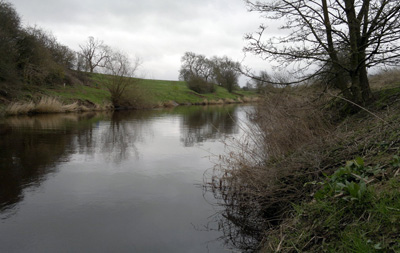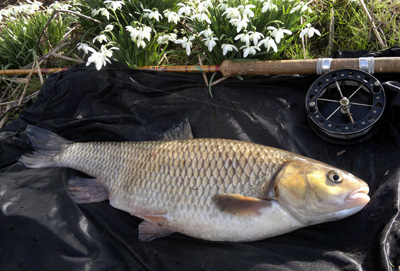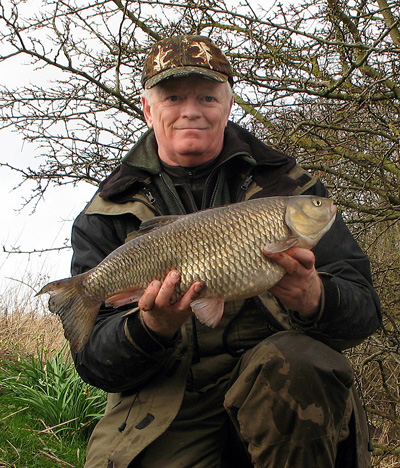I learned a valuable lesson a couple of weeks ago. Like a lot of lessons it was something I already knew, but one that I was too idle to put into practice. Mick Beecroft and I were fishing the Warwickshire Avon on a horrible day with blustery winds and heavy rain, hail and sleet showers. I spent the day tucked under my brolly feeder fishing for chub and barbel, as did Mick for a few hours, but when the feeder didn’t work he walked a mile back to the car to get his float rod.
Choosing a swim almost at random he fished bread on the float and caught five chub in less than an hour, with three fish over 5lb. I blanked. Now you might say that this was pure luck, but I know for a fact that the swim he caught in had been fished the previous day by a friend of ours who blanked, as did three others who fished the same length.
Fast forward a week and I’m on my last trip of the river season. This year business and family commitments have conspired to limit my time and my last hurrah was really more of a last whimper as it was limited to a short session on the last Friday of the season.
 The elements seemed to be conspiring against me too as heavy rain in the week had caused the river to lift sharply and then drop again, leaving it very coloured, but only slightly up an normal level and a distinctly cool 6C. The wind was blustery and in a direction that made float fishing a marginal prospect at best, as in some swims it was slightly upstream and in others distinctly downstream. Despite this I was determined to fish the float as I felt it would give me the best chance of a few chub in the less than perfect conditions.
The elements seemed to be conspiring against me too as heavy rain in the week had caused the river to lift sharply and then drop again, leaving it very coloured, but only slightly up an normal level and a distinctly cool 6C. The wind was blustery and in a direction that made float fishing a marginal prospect at best, as in some swims it was slightly upstream and in others distinctly downstream. Despite this I was determined to fish the float as I felt it would give me the best chance of a few chub in the less than perfect conditions.
The first swim was really awkward as the fish holding areas were all on the far bank and the wind direction was veering between upstream and downstream. Normally when float fishing I would use a centre pin, but the distance I had to cast, the depth of the water and the awkward wind made me opt for the safer option of my Abu 501.
This swim has around 30 yards of far bank cover and in normal (ie clear) conditions the chub will move up to intercept a trail of mash. In these conditions with the highly coloured water I’m going to have to search fish out, and with the wind as it is this is going to take some careful planning. Despite the colour in the water I’m happy to fish mash and flake as in my experience it works just as well in coloured water as it does in clear. I throw a few balls of mash in a fair way upstream and run the float through a few times to get the depth just right. I then squeeze a lump of bread flake on the hook and start to fish.
 The plan is to use the wind as best I can; fishing the top end of the swim when it is blowing downstream and casting further down the swim when it is blowing upstream. Given the conditions, I’m pleasantly surprised to hook a nice chub of around 5lb after only a few casts, but this proves to be a false dawn and I get no more bites from the swim.
The plan is to use the wind as best I can; fishing the top end of the swim when it is blowing downstream and casting further down the swim when it is blowing upstream. Given the conditions, I’m pleasantly surprised to hook a nice chub of around 5lb after only a few casts, but this proves to be a false dawn and I get no more bites from the swim.
I then start to work my way downstream exploring all of the chubby areas (the edge of cover, creases, and deeper areas) thoroughly with my float, giving each swim at least half an hour. Two hours later I arrive at a swim that has produced some good chub for me in the past in similar conditions.
This is a slower, deeper stretch with a nice near bank crease formed by a partially submerged alder at its head. I’ve already fished down to the alder without success so I know that any chub are likely to be somewhere along the crease below it. I drop a hen’s egg sized ball of mash in just upstream of the alder and check the depth, around 10ft, before running a piece of bait down the crease. This swim is sheltered from the wind so I can trot a good 30 yards down the crease without any problems.
On the second trot I get a quick dip of the float about ten yards down the swim, but it doesn’t develop any further. On the next trot I hold back slightly in the same place and the float is pulled decisively under. At first I think I’ve hooked a big barbel as a very powerful fish kites out into the current. Stalemate ensues for a while and then the fish heads off to explore the far bank. I’m not convinced it’s a barbel due to the slow ponderous fight which is punctuated by heavy head shaking. I reserve judgement and concentrate on working the fish back towards me, wishing I’d opted for a centrepin as these reels are much better than a 501 for playing big fish.
 Eventually my float breaks the surface, followed shortly afterwards by a great silver flash and a heavy boil. It’s a chub and a really big one at that. I sense a looming crisis as just upstream of me are the trailing branches of the alder, at my feet is a submerged tangle of old flag iris stems and the chub still appears to have plenty of life in it. Fortunately it kites back out into the main current and I let it drift downstream away from danger. It’s then only a matter of time and a few minutes later I draw an enormous fish into my net and sink back into my chair for a good tremble and a well deserved rest.
Eventually my float breaks the surface, followed shortly afterwards by a great silver flash and a heavy boil. It’s a chub and a really big one at that. I sense a looming crisis as just upstream of me are the trailing branches of the alder, at my feet is a submerged tangle of old flag iris stems and the chub still appears to have plenty of life in it. Fortunately it kites back out into the main current and I let it drift downstream away from danger. It’s then only a matter of time and a few minutes later I draw an enormous fish into my net and sink back into my chair for a good tremble and a well deserved rest.
When I’ve recovered I have another look at the chub. A few months ago I jokingly remarked to FM Editor Ian in an email about catching a Yorkshire seven pounder and this fish looks like it could go close. It hasn’t quite got the length though and the scales reveal it to be 5 ounces short of 7lb at 6lb 11oz.
Still, it’s my first Yorkshire six and a personal best as well! Typically, there’s nobody else about so I’m forced to do a self-take for the trophy shot. When I’ve recovered I give the swim another half hour but get no more bites. I try a few more swims, but wind is really getting up now and float fishing is almost impossible. I have a think and decide that as the peat stain is clearing slightly I might have a chance of a barbel.
I’ve got half a pint of flavoured, dead maggots, so I save a good handful for hook baits, mix the rest with a handful of Sonubaits Halli Crush and dampen the mix enough so it will just press into a cage feeder. The swim I choose is a proven winter and late season barbel swim; it has heavy cover lining the far bank with a deep channel mid-river where I’ll present my feeder.
Fishing right on Mr Barbel’s front door will result in much unseemly pulling and tugging and I prefer to draw the fish away from cover to swing the odds more in my favour. I press a good helping of my maggot and ground bait mix into the feeder, impale three maggots on a size 14 hook and swing my offering out into the channel.
An hour later I haven’t had any interest and I’ve only got half an hour left before I have to head home for tea (or else). I decide to force the issue slightly and I spray a few catapult pouches of dead maggots on the line between the far bank cover and the channel. My experience is that this will often provoke a lethargic cool water barbel to move out of cover to feed on the sprinkling of maggots. Sure enough, a quarter of an hour later my rod tip pulls smartly round and I latch into a good barbel. Unusually, it decides to carry out most of the fight near the surface but after a lively struggle I net a nice fish which goes 8lb 6oz on the scales.

It’s now 4 o’clock and as I have to negotiate the M62 in Friday night car park mode and arrive home in time for tea I decide to call it a day. What an end to the season!










